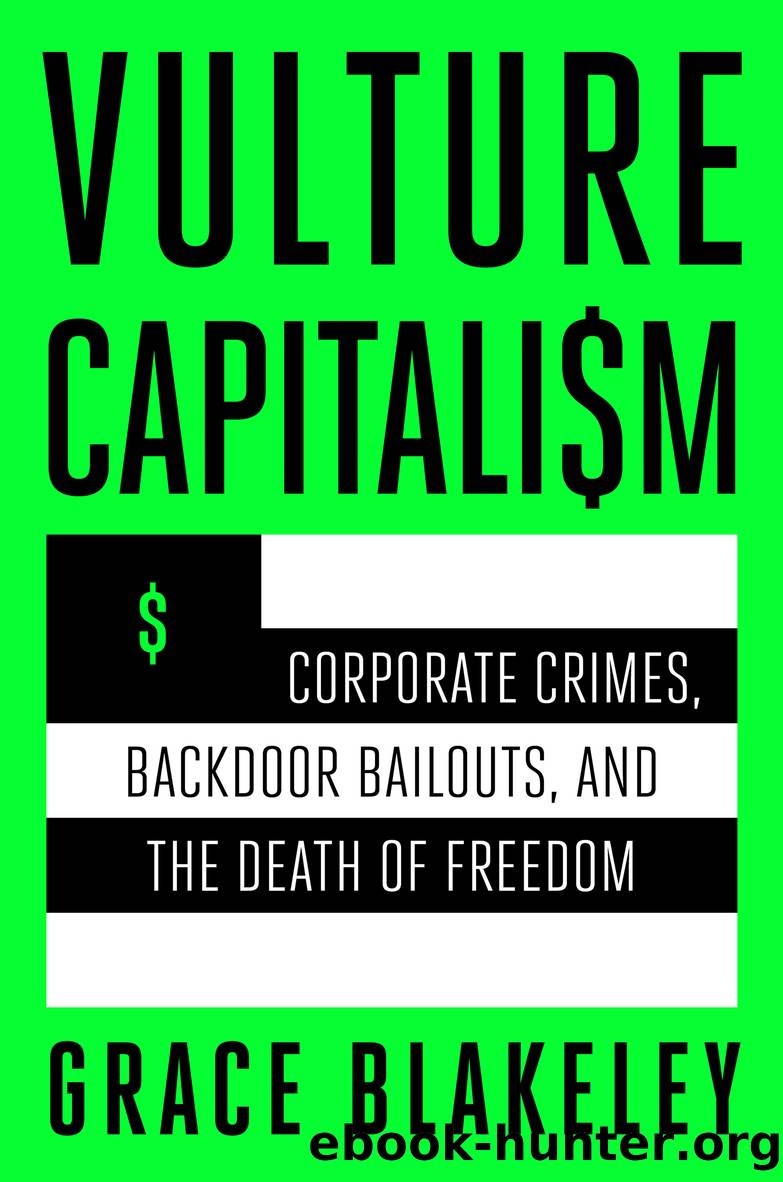Vulture Capitalism by Grace Blakeley

Author:Grace Blakeley
Language: eng
Format: epub
Publisher: Atria Books
Published: 2024-03-12T00:00:00+00:00
Banana Republics
One of the earliest examples of US attempts to keep down a country attempting to modernize was Guatemalaâthe original âbanana republic.â The United Fruit Companyânow known as Chiquitaâbegan harvesting bananas in the late nineteenth century. The company had been incorporated when a US businessman was invited by the Costa Rican government to construct a railway linking the capital to the coast.65 The railway was never completed, but the bananas planted to feed the workforce on the surrounding land proved an extraordinarily profitable export. The United Fruit Company was formed in 1899; by 1900 it was the worldâs largest exporter of bananas.66
The company controlled vast tracts of land across Central America, and much like Ford in the Amazon, came to run what looked like a parallel state infrastructure. It ran the Guatemalan postal service and was granted a ninety-nine-year concession to build and run the railway line from Puerto Barrios on the Atlantic to Guatemala City.67 Later, the Guatemalan government gave the UFC a concession to plant on 100 square kilometers of uncultivated land even as ordinary Guatemalans struggled to access land of their own.68
By the 1930s, the UFC was the largest single landowner, and the largest employer, in Guatemala. Much of the land it owned had been forcibly expropriated from the indigenous Maya population, with the active support of the Guatemalan state. Its workers were treated appallingly, and over the course of the 1920s and 1930s multiple strikes were organized against low wages and job cuts. Most were broken up, often with the support of the Guatemalan government.69
Large landownersâincluding the UFCâresponded by supporting the candidacy of Jorge Ubico, who promised to clamp down on working-class and indigenous revolt. Ubico was a large landowner and an admirer of European fascism who had compared himself to Mussolini and Napoleon.70 He had risen through the ranks of the Guatemalan army after studying in the US and participated in several coups before finally taking power in 1931.71
Ubico did not disappoint his backers, and immediately set about constructing a repressive, authoritarian regime that targeted communists and the indigenous population, while consolidating the power of landowners.72 He handed over tracts of land to the UFC, granted it tax exemptions, and enabled the companyâs forced expulsions of local peasants and indigenous people.73 Landownership was such a singularly important political issue that Ubico even passed a law that legalized execution by landowners protecting their property.74 Also conscious of the interests of industrialists, he began construction on a number of large infrastructure projects, many of which made use of the forced labor of peasants and indigenous people.
The actions Ubico took to consolidate the power of the UFC made him a natural ally of the US, whose political leaders approved as much of his ruthless annihilation of communists and trade unionists as they did his protection of US businesses.75 But when unrest began to mount in Guatemala during the 1940s, the US was busy dealing with the fallout of war in Europe and Japan. Cornered by the escalating power of the labor movement, and unable to rely on international support, Ubico was forced to step down.
Download
This site does not store any files on its server. We only index and link to content provided by other sites. Please contact the content providers to delete copyright contents if any and email us, we'll remove relevant links or contents immediately.
International Integration of the Brazilian Economy by Elias C. Grivoyannis(111057)
The Radium Girls by Kate Moore(12026)
Turbulence by E. J. Noyes(8047)
Nudge - Improving Decisions about Health, Wealth, and Happiness by Thaler Sunstein(7706)
The Black Swan by Nassim Nicholas Taleb(7128)
Rich Dad Poor Dad by Robert T. Kiyosaki(6631)
Pioneering Portfolio Management by David F. Swensen(6300)
Man-made Catastrophes and Risk Information Concealment by Dmitry Chernov & Didier Sornette(6019)
Zero to One by Peter Thiel(5798)
Secrecy World by Jake Bernstein(4751)
Millionaire: The Philanderer, Gambler, and Duelist Who Invented Modern Finance by Janet Gleeson(4478)
The Age of Surveillance Capitalism by Shoshana Zuboff(4291)
Skin in the Game by Nassim Nicholas Taleb(4248)
The Money Culture by Michael Lewis(4205)
Bullshit Jobs by David Graeber(4190)
Skin in the Game: Hidden Asymmetries in Daily Life by Nassim Nicholas Taleb(4004)
The Dhandho Investor by Mohnish Pabrai(3764)
The Wisdom of Finance by Mihir Desai(3746)
Blockchain Basics by Daniel Drescher(3580)
